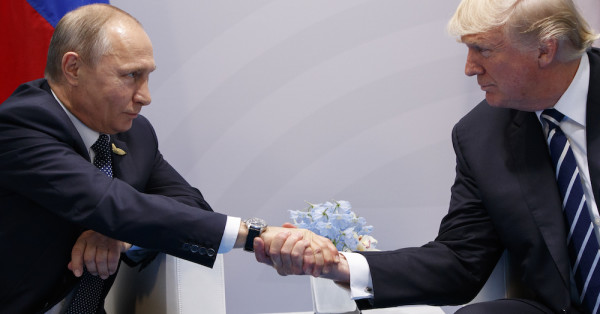

The United States and Russia have brokered a ceasefire deal with regional powers in southwestern Syria, U.S. officials told Reutersand the Associated Press on July 7, defusing the escalating tensions between the two militaries over the fate of the war-torn country in recent weeks.
News of the ceasefire came amid President Donald Trump and Russia President Vladimir Putin’s first official bilateral meeting at this year’s G20 Summit in Hamburg, Germany, an unusually lengthy visit clouded by increasing political and legal concerns stemming from the Trump campaign’s alleged ties to Russian government officials during the 2016 presidential election.
The focus of the ceasefire centers on the southern part of the country, where pro-regime militias have repeatedly invaded deconfliction zones near the At Tanf garrison established by the U.S-led coalition fighting against ISIS. The Associated Press reports that Jordan and Israel, which borders the region, have joined the agreement to prevent the warfare between Syria’s various domestic and international forces from spilling into their territory.
Tensions between the U.S. and Russia reached a boiling point in mid-June after a U.S. F/A-18E Super Hornet shot down a Syrian Air Force Su-22 that bombarded coalition-backed Syria Democratic Forces fighters outside the established deconfliction zone of Ja’Din. In retaliation, Russia threatened to target U.S. and coalition aircraft flying west of the Euphrates River.
(The Associated Press rightly points out that the pro-regime incursions into coalition deconfliction zones are a different matter than the “de-escalation zones” established in an agreement between Russia, Turkey and Iran, a deal the U.S. is not party to.)
It is unclear how this cease-fire would affect U.S. and coalition combat against ISIS as part of Operation Inherent Resolve, particularly the crucial siege currently underway against the jihadis’ last major stronghold of Raqqa, in the north. Public affairs officials with U.S. Central Command and OIR referred Task & Purpose to the State Department, which did not immediately respond to requests for comment.
Interestingly, the news of the cease-fire comes amid a push from Trump’s diplomatic corps to remind the world of the administration’s stance on Syria’s chemical weapons. As initial reports of the deal surfaced on the Reuters and Associated Press wires, the Department of State published a memo on America’s role in “reinforcing the global norm against chemical weapons.”
“The continued use of CW in Iraq and Syria provides a sobering reminder of the challenges that remain,” wrote acting Assistant Secretary of State Anita Friedt. “We urge the international community to stand with us and speak with one voice against CW use anywhere, by anyone.”
We’ll see what Putin has to say about that.
WATCH NEXT: